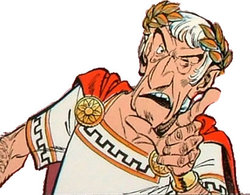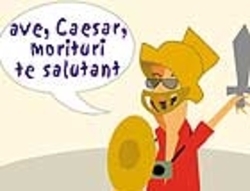

Here are 10 myths about the Romans exploded...!
1) JULIUS CAESAR'S LAST WORDS WERE 'ET TU BRUTE'
 Well, only in Shakespeare's version of the assassination. Probably our best ancient source is Suetonius and he records the words as (in Greek) "kai su teknon" - or "you too my child". What this means, in fact, isn't so clear. If it is has a question mark, it smacks of quizzical, dying desperation. Give it an exclamation mark and it becomes a threat ("they'll get you too kid...").
Well, only in Shakespeare's version of the assassination. Probably our best ancient source is Suetonius and he records the words as (in Greek) "kai su teknon" - or "you too my child". What this means, in fact, isn't so clear. If it is has a question mark, it smacks of quizzical, dying desperation. Give it an exclamation mark and it becomes a threat ("they'll get you too kid...").
2) ROME WAS BUILT ON SEVEN HILLS.
Some serious miscalculation here. Palatine, Aventine, Capitoline, Janiculan, Quirinal, Viminal, Esquiline, Caelian, Pincian, Vatican. That's 10 for a start. Though it all depends I suppose, on what you call a hill.
3) ROMANS HAD 'VOMITORIA' TO BE SICK IN BETWEEN COURSES AT LAVISH
DINNERS
Sorry. This is an old one, But vomitoria were the exit routes which spewed people out of the amphitheatres.
4) ROMAN MEN DRESSED IN TOGAS
OK sometimes they did. But it was very formal wear - and it's a bit like saying 'Englishmen wear dinner jackets'. Actually you'd have seen all kinds of dress on the Roman street, from tunics to trousers -- and, just to confuse things, prostitutes in togas.
5) NERO FIDDLED WHILE ROME BURNED
Not if you mean that he sat around ineffectually twiddling his thumbs while the city went up in flames. Actually what Nero did was fiddle in another sense: he played the violin (or so it was said).
6) THE PLEBEIANS WERE THE ROMAN POOR
OK Romans, just like us, did sometimes use the word 'plebeian' or 'plebs' for the 'great unwashed' (literally 'sordida plebs'). But in the strict sense both 'plebeian' and 'patrician' were old hereditary divisions of the Roman people. These may once have signalled the poor/powerless versus the rich/powerful. But by the time of the later Republic there were enormously rich plebeians - like Marcus Licinius Crassus, the plutocrat who famously said that you couldn't be counted as rich if you couldn't raise your own private army.
7) GLADIATORS SAID 'HAIL CAESAR, THOSE ABOUT TO DIE SALUTE THEE' BEFORE EACH SHOW
 This favourite phrase is actually attested only once in classical antiquity - and not at a gladiatorial show. It was apparently spoken by the participants at a mock naval battle laid on outside Rome by the emperor Claudius. I tried to lay this particular myth to rest in the book on the Colosseum I wrote with Keith Hopkins - but not with much success I fear.
This favourite phrase is actually attested only once in classical antiquity - and not at a gladiatorial show. It was apparently spoken by the participants at a mock naval battle laid on outside Rome by the emperor Claudius. I tried to lay this particular myth to rest in the book on the Colosseum I wrote with Keith Hopkins - but not with much success I fear.
8.) WHEN THE ROMANS FINALLY DESTROYED CARTHAGE IN 146 BCE, THEY PLOUGHED SALT INTO ITS SOIL -- TO MAKE IT COMPLETELY BARREN
This is slightly trickier ground, but I know of no ancient writer who says this. It's a view that got common currency thanks to an article by B Hallward in the first edition of the Cambridge Ancient History - and he gives no ancient reference.
9) THE ROMANS WERE MUCH SMALLER THAN US
Depends on who you mean by 'us'. The skeletons found in Pompeii and Herculaneum actually suggest that the Roman inhabitants were on average a bit taller than the modern Neapolitans.
10) HADRIAN BUILT HIS WALL TO KEEP THE BARBARIANS OUT OF THE PROVINCE OF BRITANNIA
Only if he was a military idiot. A good proportion of it is built only in turf anyway, which wouldn't have deterred many self respecting barbarians. Even if the rest was in stone, it is now thought much more likely that the whole thing was administrative (for customs levying perhaps) - and to help east-west communications.
And that's only the first ten!
Professor Mary Beard
* Reproduced from the Times Literary Supplement. August 30th 2007 with the very kind permission of Professor Beard
Mary Beard's appearance at New York Public Library, November 30, 2011, attracted a large and enthusiastic audience, many lining up almost an hour in advance to hear "the greatest living classicist of our age," as she was introduced by Robert Silvers, editor of The New York Review of Books, whose fortieth anniversary in this capacity it honored. The latest issue of this publication was found at every seat.
She defined the classics as the common cultural propery we share about out past, embedded in how we think about and understand our history. The extent to which the classics resonate in our cultural life can be shown by the revival of interest in the play, The Browning Version, about a Latin teacher who is rejected by his peers and students but looked upon "graciously" by the gods, in this centennial year of Terrence Ratigan's birth. Of the novel, A Secret History, by Donna Tarrt, a personal favorite of mine, she asked if the same story could have been set in a geography department rather than a department of classics in a New England college.
Although classical works were originally written in Latin or Greek, everyone need not study these languages, especially as a means to learning another language, which is best accomplished by studying that language itself. Rather, there should be people expert in Latin and Greek to whom we turn for an accurate rendering of the works of the ancients. Too often misunderstanding is fostered by passing on platitudes and inaccurate versions of the classics, such as the commonly held notion that the Athenians "invented" democracy instead of merely contributing the word for it.
The present day decline in or skepticism regarding the classics, which is seen in the closing of university classics departments, may be attributed in part to the domination of the field by white males and their association with class privilege. Also the fact that many classic works treat the subjects of slavery, tyranny, and imperialism has made them unpopular in today's world. Still, we see an upsurge in the use of the classics in films, literature, and modern culture.
The question, "Do the Classics Have a Future?" the title of the lecture, she answered by pointing out how popular the topic has been since the Renaissance, and how it continues to be the subject of many lectures and books. Even though the classics are examined like a sick or dead patient requiring an autopsy, how can they be truly dying when there is such interest in their supposed decline? The classics inspire a fear of loss and nostalgia for the past, a feeling that our predecessors were closer to the past. To bridge the gap between antiquity and the present, scholars and teachers need to animate and ventriloquise the past, as Mary Beard has done in her book, The Fires of Vesuvius, and Ginny does in our Latin classes.
Lucylibr